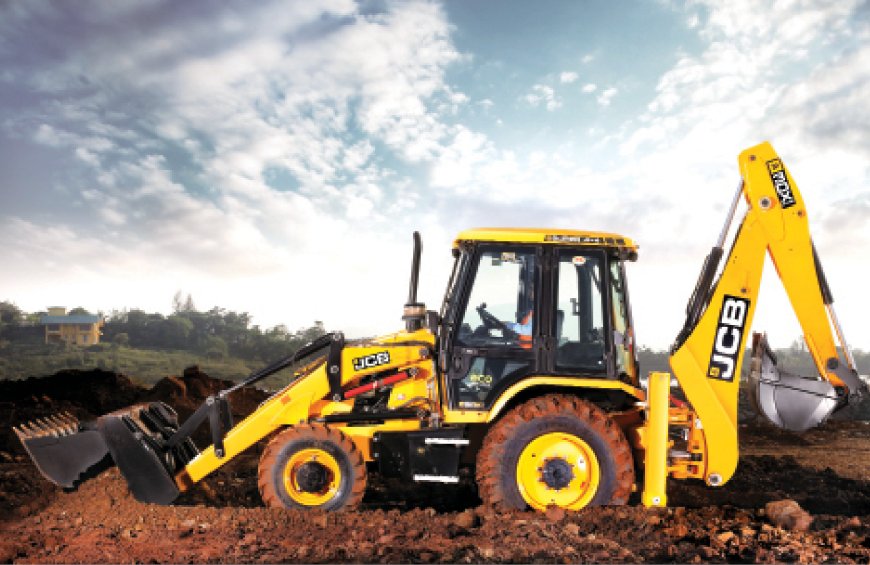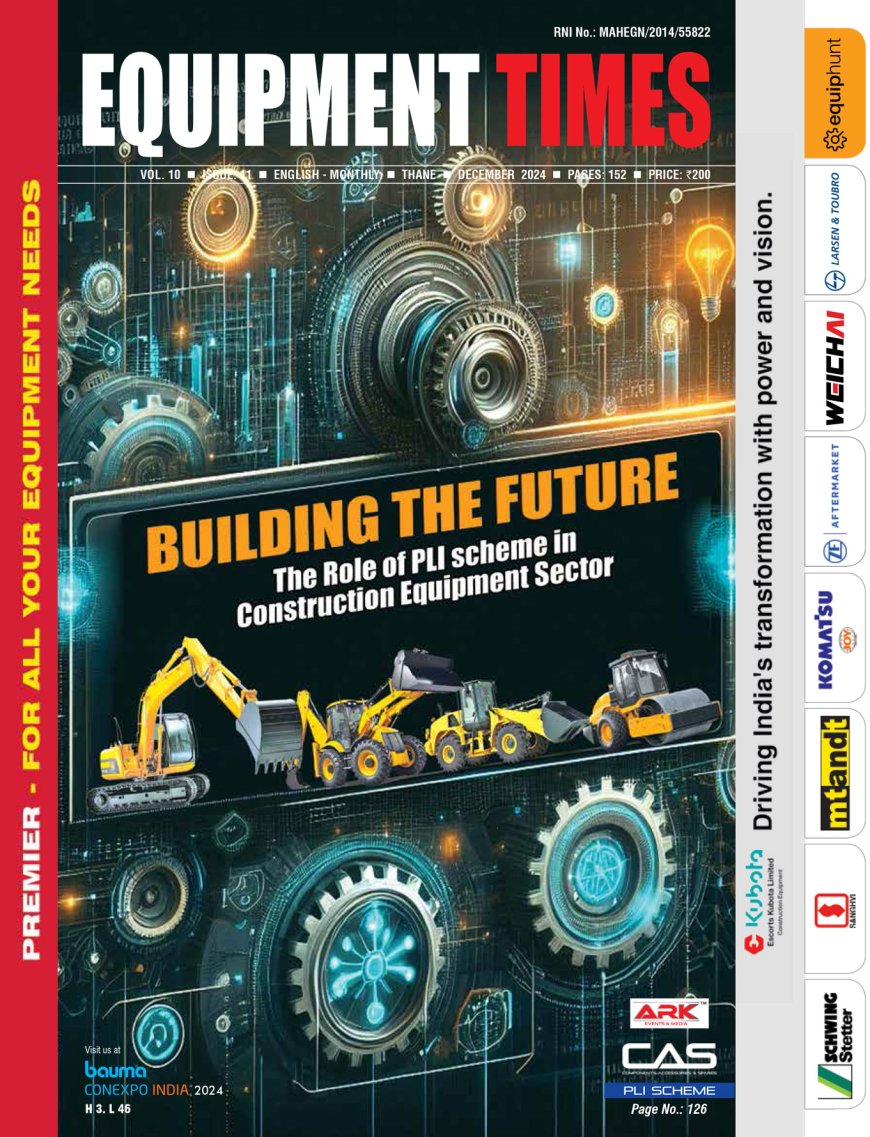About 20 percent of JCB India’s revenues come from exports
Jasmeet Singh AVP, Corporate Communications & Corporate Relations, JCB India Limited The concept of ‘Make in India’ for the world seems to have caught up with most of the OEMs. What is your take on


Jasmeet Singh
AVP, Corporate Communications & Corporate Relations,
JCB India Limited
The concept of ‘Make in India’ for the world seems to have caught up with most of the OEMs. What is your take on this? Indian CE industry taken as whole what is the current growth and expected CAGR in export? Brief us on the scope and potential for export of your range of products?
The ‘Make in India’ initiative is a part of the wider set of nation-building goals of the Government of India. Aimed at promoting indigenous manufacturing, encouraging foreign investments and generating skilled workforce, the ‘Make in India’ programme is pushing India’s manufacturing industry to account for 25% of its GDP by 2025. Making the initiative a successful reality, many OEMs have been adopting the same and exporting to the world from India.
JCB India is an embodiment of the ‘Make in India’ programme and has remained committed to India’s growth story. We have efficiently and effectively contributed to the building of world-class infrastructure in the country. Even before the ‘Make in India’ movement started, JCB India’s whole theme revolved around ‘Make in India for the world’. The theme further extended to ‘Create in India’ with JCB’s design centres being operational in India.
JCB India today has five state-of-the-art factories in India, and a sixth one is under construction in Vadodara. We manufacture a wide range of world-class equipment for India and also for the global markets. With all factories operating on the principles of ‘Zero-defect’ and ‘One Global Quality’, JCB India has been successful in exporting world class products to over 100 countries including developed markets. Our exports contribute 20 per cent to the company’s revenue.
Could you brief us on the roadmap and strategies initiated to become a successful player in the global markets?
In its journey of successful operations in India and globally, JCB has grown to become a full-range construction equipment partner, offering indigenous, innovative and versatile solutions of One-Global Quality. This has helped us gain a strong position for ourselves in the global arena.
Innovating continuously, JCB India has been designing and manufacturing advanced NEXT-Gen machines which today, are being widely adopted by customers in India and other countries. To maintain our position in the market, we are and will be investing more and more in automation and in diversifying our product portfolio.
Furthermore, JCB India has deep roots with over 380 suppliers. Their support and alignment with Company’s objectives is ensured through various supplier development and cluster initiatives that we have in place for end-to-end support and training. The Company also consistently endeavours to formalize the sector through skilling the trainers at its 15 Operator Training Centres in India.
Which are the major markets of focus and what are the factors contributing to it? Are there separate investment/R&D efforts for this? Could you brief us on the same?
Today, about 20 percent of JCB India’s revenues come from exports. South Asia, South East Asia, Middle Asia, Africa and APAC regions have been the key markets for us as these regions are witnessing rapid infrastructure development and generating greater equipment demand. We export to more than 100 countries in these regions. However, Middle East and Africa are the biggest export market for JCB India, followed by South East Asia and Latin America. Some components manufactured in the country are also exported to the UK.
While we incorporate modifications in our indigenously manufactured products in accordance to the demand in other countries, we do not put in separate investment or R&D efforts for the export items. We operate on the philosophy of one-global quality and hence, all our machines, made and designed in India, are at par with the world.
Do you have a separate product range for the global market?
Each product introduced by JCB is a result of market analysis and customer feedback sessions. Right from designing to engineering to manufacturing, JCB believes in keeping the customer at the centre of every product. All our offerings, be it our range of world leading products or the after-market support, are focused on ensuring customer satisfaction.
Manufacturing over 60 different products in eight different categories in India, JCB India creates bespoke products which are specific to different geographies, demographics and market needs. We also stay open to customizing products and models based on buyer and market needs.
Catering to more than 100 countries globally, our range of products includes backhoe loaders, excavators, compactors, telehandlers, wheeled loaders, skid steer loader, mini excavators and generators. Each of these machines has different specifications.
As the global markets are highly competitive, especially in terms of backup support, how have you ensured the same to cut a niche in those markets?
JCB has over 750 dealers all across the world. All the markets where JCB products are exported have dealerships that support and service JCB’s machines. Our dealers have made significant investments in setting up their product support network.
Another noteworthy addition in JCB’s product support is the introduction of JCB LiveLink, an advanced Telematics technology for remote fleet management. Our dealerships across the world have set up command centres to ensure 24X7 support to the customers, helping them plan better for service schedules and sharing tips for preventive maintenance.
What do you think are the major challenges that you face in the global markets and how do you address these challenges?
The Construction Equipment industry globally has witnessed a slowdown in the past year. While the industry players are gradually coping with the market pressure, we could spot a few challenges which we took as learning for our future growth. These challenges are:
- Geopolitical issues in different countries that directly impact demand consumption of construction equipment
- Regulatory challenges can impact the market dynamics. Therefore, we keep a close watch on all the markets, customers in different countries and on the upcoming trends
- Also, the Construction Equipment (CE) industry recently has been witnessing a talent crunch. Hence, there is a need for construction equipment manufacturers to engage with academic institutions and leverage opportunities to attract potential employees. This can be ensured by showcasing the evolution brought in the industry by IoT and Big Data to the young talent
How does the company address the logistical/policy-based challenges with reference to the global market?
India has a very well-crafted process for exporting Construction equipment to other countries, which is via seaports. JCB India also uses these sea ports to export the machines to its other markets. The location for our Vadodara factory hence was chosen because it was near to a seaport. The same was for our Pune facility. We at JCB also do our bit to have a proper systematic process for logistics. Hence, we have not faced any logistical barriers in terms of export in India.
How do you assess the impact of the Budget 2020 on the CE industry? Also, tell us on the outlook especially the product range that you deal with?
The Budget FY 20-21 has once again brought to light the Government’s unwavering focus on infrastructure and its thrust on the sectoral development. A planned investment of INR 1.7 lakh crore in the development of transport infrastructure in India is certainly a significant step towards maintaining a progressive path for the industry. Announcement of kick-starting new projects under roads and highways, urban rejuvenation and building of new airports under the UDAN scheme, are expected to drive growth for the sector this year. The Government’s focus on rural infra development and last-mile connectivity has also been evident with an increased outlay of 19,500 crores (39% over FY20) to the Pradhan Mantri Garmodaya Yojana.
Further, capital infusion in PSU banks and infrastructure finance companies, coupled with full tax exemption to Sovereign Wealth Funds for investments in Infrastructure and tax reforms, is expected to encourage more liquidity in the marketplace. Setting up of a single investment clearance window is another significant positive of the Budget. These sustainable ways of funding infra in India will certainly have a crucial impact on the industry that is gradually recovering from a slowdown. The Budget also rightly addresses the long-persistent industry challenge, i.e., lack of skills, with NSDC’s intervention for skill development in the infrastructure sector.
To conclude, the Budget announcement for this year is aligned with the National Infrastructure Plan that had set the expectation for the Budget. Holistically capturing all the relevant aspects of the industry, the Budget 20-21 seems promising to provide the required impetus to the economy. We at JCB India, are ready to support the industry growth and shall endeavor to help convert outcome envisioned from the Budget into reality through sustainable implementation. All our products are aligned with the current and upcoming market demand. Manufacturing of BS IV machines is the best example of JCB India’s readiness for the market needs.
Hits: 489










